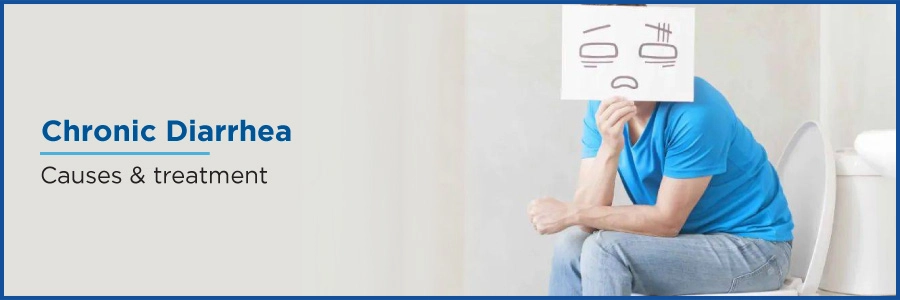- Cardiology 84
- Dermatology 45
- Endocrinology 33
- ENT 16
- Fertility 190
- Gastroenterology 78
- General-Medicine 81
- Gynecology 80
- Hematology 19
- Infectious-Diseases 33
- Neurology 52
- Oncology 34
- Ophthalmology 23
- Orthopedics 69
- Pediatrics 31
- Procedure 23
- Public-Health 144
- Pulmonology 59
- Radiology 8
- Urology 68
- Wellness 161
- Woman-and-child 77

Overview of Chronic Diarrhea: Symptoms, Causes and Treatment
Chronic diarrhoea is a condition characterised by ongoing episodes of loose or watery stools lasting for several weeks or more. It differs from acute diarrhoea, which typically resolves within a short time. Chronic diarrhoea can be a persistent problem, often indicating an underlying health issue or gastrointestinal disorder.
Chronic Diarrhoea Symptoms
Secure your health with a second opinion. Make informed decisions and book your appointment today!
Get A Second OpinionChronic Diarrhoea Causes
chronic diarrhoea in children and adults involves persistent loose stools. Over three to four weeks. Symptoms include frequent bowel movements, abdominal cramping, and signs of dehydration.
Causes vary: children often suffer from infections like rotavirus, while adults may experience conditions such as irritable bowel syndrome or inflammatory bowel disease. Effective treatment requires accurate diagnosis to manage symptoms and promote recovery.
Essential Considerations for Chronic Diarrhoea at any Age Include
Gastrointestinal Infections
Chronic diarrhoea can result from ongoing gastrointestinal infections caused by bacteria, viruses, or parasites in the gastrointestinal tract.
Inflammatory Bowel Disease (IBD)
Conditions like Crohn's disease and ulcerative colitis can lead to chronic inflammation in the digestive tract, resulting in diarrhoea.
Food Intolerances
Intolerance to certain foods, such as lactose or gluten, can cause chronic diarrhoea when consumed regularly.
Malabsorption Syndromes
Conditions like celiac disease or pancreatic insufficiency can impair the body's ability to absorb nutrients, leading to chronic diarrhoea.
Medications
Certain medications, such as antibiotics, laxatives, or nonsteroidal anti-inflammatory drugs (NSAIDs), can disrupt the balance of bacteria in the gut and cause diarrhoea.
Functional Gastrointestinal Disorders
Conditions like irritable bowel syndrome (IBS) or bile acid malabsorption can lead to chronic diarrhoea without an identifiable underlying cause.
Chronic Diarrhoea Treatment
- Anti-diarrheal medications can alleviate diarrhoea, but they are not recommended for long-term use. Also, they cannot be taken on your own without any doctor’s recommendation.
- The underlying cause determines the treatment for chronic diarrhoea. If you have ulcerative colitis, Crohn's disease, pancreatitis, or celiac disease, for example, your doctor will discuss treatment options with you and recommend the best course of action.
- Prescription medications such as an immunosuppressant or a corticosteroid may be used in treatment.
Ready to take control of your health journey? Book your appointment now and start your path towards wellness today!
Book an AppointmentLifestyle and Dietary Changes
- Caffeine and alcoholic beverages should be avoided.
- Consuming low-fiber foods
- To avoid dehydration, drink plenty of clear fluids.
- Limiting food portions in order to avoid overeating
Chronic Diarrhoea Prevention
- Drink water from a clean source or filter it.
- Before cooking, thoroughly clean the utensils.
- Properly wash fruits and vegetables before eating.
- Meat should be thoroughly cooked.
- After handling food, wash your hands.
- To avoid contamination, keep kitchen surfaces clean.
- After using the restroom, changing a diaper, or attending to a sick person, wash your hands.
Frequently Asked Questions
Chronic diarrhea can be caused by various factors such as gastrointestinal infections, inflammatory bowel disease, food intolerances, malabsorption syndromes, medications, and functional gastrointestinal disorders.
The four main types of diarrhea include osmotic diarrhea, secretory diarrhea, inflammatory diarrhea, and dysentery.
To stop chronic diarrhea, it's essential to identify and address the underlying cause. Treatment may involve medications, dietary modifications, managing stress, and staying hydrated.
Foods that may help alleviate diarrhea include bananas, rice, applesauce, toast (BRAT diet), plain yogurt, boiled potatoes, oatmeal, boiled carrots, lean proteins like chicken or fish, broth-based soups, steamed vegetables, and herbal teas like chamomile or peppermint.

- Cardiology 2132
- Dermatology 168
- Endocrinology 135
- ENT 97
- Fertility 217
- Gastroenterology 232
- General 478
- General-Medicine 1685
- Gynecology 169
- Hematology 85
- Infectious-Diseases 208
- Neurology 207
- Oncology 345
- Ophthalmology 65
- Orthopedics 187
- Pediatrics 83
- Procedure 72
- Public-Health 209
- Pulmonology 126
- Radiology 13
- Second Opinion 311
- Urology 294
- Wellness 600
- Woman-and-child 447
- Others 10217
Related Blogs
If you have any questions, please fill out the enquiry form or call us, and we will get back to you promptly.
040-68334455